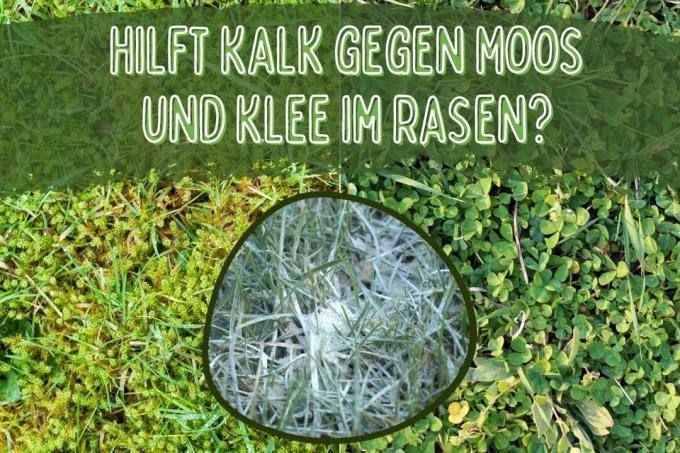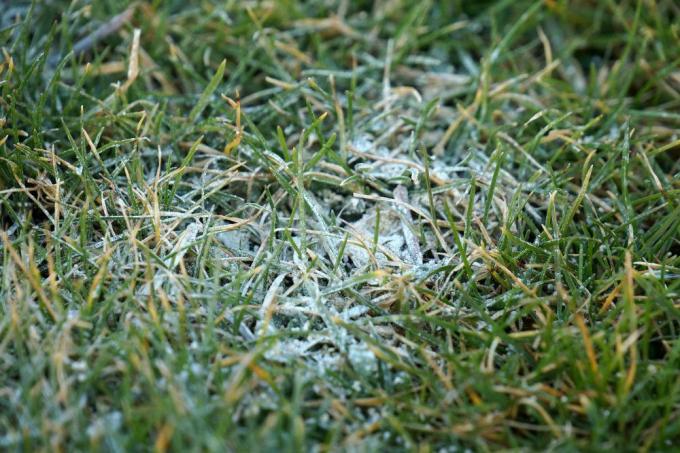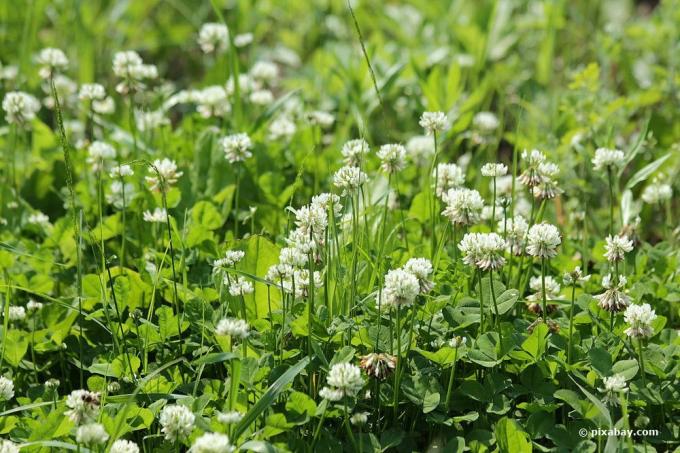
table of contents
- PH value
- Mosses
- Limescale
- clover
- Prevention and Removal
- frequently asked Questions
Whether lime against moss and clover in the race helps, depends on the cause. We reveal the advantages and disadvantages of the maintenance measure here.
In a nutshell
- acidic soil favors moss
- Lime can help against the growths
- Determining the cause is required as the first step
- Application should be done at the right time
- Even distribution and good irrigation are crucial
PH value
Before lime is used on the lawn, the pH value of the soil should be determined. The test required for this can be carried out independently. However, it is also possible to take a sample of the soil and have it examined, for example, in a hardware store with a garden center or a nursery.
Before doing this, you should of course inquire whether this service is offered. If the test is to be carried out yourself, test strips can also be purchased in hardware stores or online. A test device is an alternative. These are already being offered very cheaply and can also be used for indoor plants, for example.

Tip: The pH of the turf soil should be between 5.5 and 7.5. This makes the substrate slightly acidic to neutral. If the value falls below or rises above it, appropriate measures are required.
Mosses
Moss thrives best when the following criteria are met:
- Soil slightly acidic to acidic
- little light
- lack of nutrients in the substrate
The advantage of this is that the number of reasons is manageable, making it easy to find the cause of the spread. A test and a control of the location are enough to find the trigger.
If the pH value is below 5.5, the application of lime can quickly provide a remedy. Fertilizing or creating better lighting are advisable in the other cases.

Limescale
If mosses have spread on the lawn and the pH value is too low, lime can be used to neutralize it. However, there are a few factors that are critical. These are:
- even distribution
- correct dosage
- adequate watering after application
- pay attention to your own safety
To achieve this, the following steps are required:
- To ensure your own safety, protective goggles and a face mask should be worn. This prevents the lime from getting into the eyes or respiratory tract.
- Liming should be done when the lawn has not just been fertilized or is about to be fertilized.
- Ideally, the lawn is scarified before the lime is applied so that it can penetrate better.
- A spreader can be used to distribute the material evenly. In addition, the effort, especially in terms of time, is very low. The dispensing should be set to dispense 150 to 200 grams per square meter.
- After the distribution, the area must be well watered. This will prevent chemical burns on the roots.
Tip: After carrying out the measure, another test of the pH value is advisable in order to apply more lime if necessary and to achieve the desired result.

clover
In contrast to moss, they thrive Clover varieties especially on basic soils. Liming the surface is therefore not recommended. However, a test of the pH value must also be carried out so that appropriate countermeasures can be taken.
If the value is too high, it is necessary to acidify the soil. The following means are recommended for this:
- Oak leaf compost
- Iron sulfate
- Coffee grounds
- Rainwater
- sulfur
- Grape marc
- peat
Tip: Appropriate fertilizers and the avoidance of hard tap water can prevent an excessively high pH value and thus clover.

Prevention and Removal
Whether the lawn looks unsightly due to moss or clover, in any case the unwanted plants cannot be removed by liming or fertilizing. Only further spread can be prevented. However, there are measures that can be taken to prevent them.
-
Testing: Regular analyzes make it possible to counteract problems quickly.
-
Mowing: Frequent mowing ensures that the grass plants branch out and grow thicker. This means that mosses and weeds have less chance of spreading.
-
Scarifying: Removing thatch aerates the soil, improves the penetration of nutrients and water and can prevent waterlogging.
- Fertilize: The stronger the grass plants are, the better they can assert themselves against other plants. Appropriate fertilization therefore has a preventive effect against spreading.
Tip: Choosing a resistant type of lawn and coordinating the substrate beforehand also helps to keep mosses, clover and weeds away.

frequently asked Questions
Special lawn lime or garden lime are suitable for increasing the pH value. In any case, it is important to pay attention to the manufacturer's instructions.
Entry should be avoided to prevent irritation or even chemical burns. Pets are also to be prevented from playing or rolling around on the lawn. Normal use is possible again after watering it several times and for about a week.
Yes, it is advisable to mow the lawn beforehand. This also applies to fertilizing or acidifying the soil. The respective agents can thus penetrate the soil more easily.


